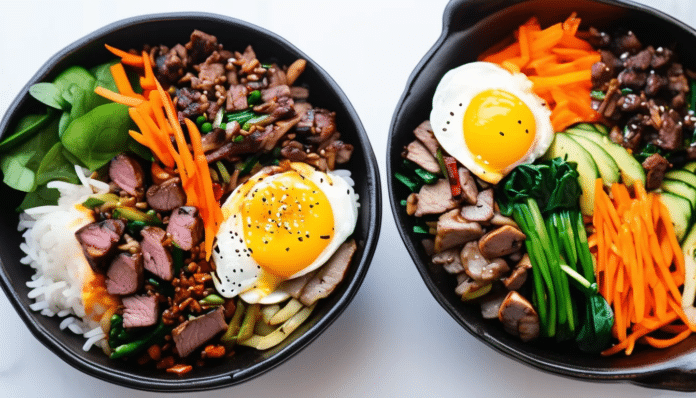Korean Bibimbap is a colorful and satisfying rice bowl that beautifully showcases a variety of vegetables, proteins, and flavors, all harmoniously combined in one dish. Traditionally served in a hot stone bowl, bibimbap features a base of steamed rice topped with an array of sautéed and seasoned vegetables, such as spinach, carrots, and mushrooms, along with marinated beef or tofu. A fried egg sits atop the dish, and it’s finished with a drizzle of spicy gochujang (Korean chili paste) for a kick of heat. This vibrant meal is not only visually appealing but also incredibly versatile, allowing you to customize it with your favorite ingredients. Bibimbap is perfect for a wholesome dinner that brings the family together around a shared table, celebrating the rich flavors of Korean cuisine.
Ingredients:
For the Bibimbap:
- 2 cups cooked short-grain rice (or jasmine rice)
- 1 cup spinach, blanched and squeezed dry
- 1 cup carrots, julienned
- 1 cup zucchini, julienned
- 1 cup shiitake mushrooms, sliced
- 1 cup bean sprouts
- 1 cup marinated beef (bulgogi) or tofu, cooked
- 2 large eggs
- Sesame oil, for drizzling
- Sesame seeds, for garnish
- Gochujang (Korean chili paste), for serving
For the Beef Marinade (if using):
- 1/4 cup soy sauce
- 2 tablespoons sugar
- 2 tablespoons sesame oil
- 2 cloves garlic, minced
- 1 teaspoon grated ginger
- 1/2 teaspoon black pepper
- 1 green onion, chopped
Instructions:
- Marinate the Beef (if using): In a bowl, combine soy sauce, sugar, sesame oil, garlic, ginger, black pepper, and green onion. Add the sliced beef and marinate for at least 30 minutes.
- Prepare the Vegetables: In a skillet, heat a small amount of oil over medium heat. Sauté each vegetable separately: the carrots, zucchini, and mushrooms until tender, and briefly sauté the bean sprouts and spinach. Season each with a pinch of salt and a drizzle of sesame oil. Set aside.
- Cook the Beef: In the same skillet, cook the marinated beef until browned and cooked through, about 3-5 minutes. If using tofu, sauté it until golden and crispy. Set aside.
- Fry the Eggs: In a small non-stick pan, fry the eggs sunny-side up, or to your desired doneness.
- Assemble the Bibimbap: In a large bowl, place a generous serving of cooked rice as the base. Artfully arrange the sautéed vegetables, cooked beef or tofu, and the fried egg on top.
- Garnish and Serve: Drizzle with sesame oil, sprinkle with sesame seeds, and add a dollop of gochujang to taste.
- Enjoy: Mix everything together before eating, savoring the wonderful blend of flavors and textures in this classic Korean Bibimbap. It’s a wholesome and satisfying dish that will leave you craving more!

